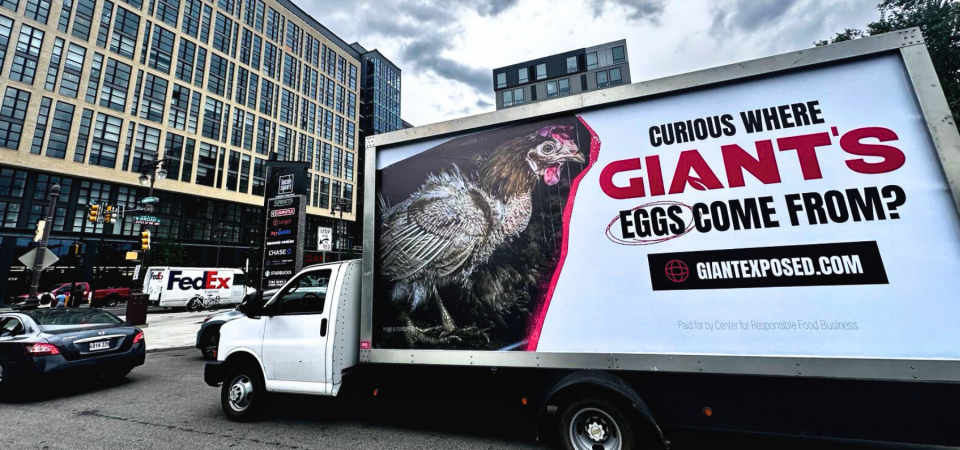This week across the city, a cheeky guerrilla marketing and billboard campaign warns Philadelphians: “I wouldn’t buy the eggs at Giant if I were you.” The supermarket chain got its own message: “Philly doesn’t f*** with animal abusers.”
Launched by a nonprofit that advocates for consumer protection and corporate responsibility, the campaign targets Giant’s practice of allowing egg-laying hens to be kept in battery cages: small metal enclosures that severely restrict the birds’ movement and cause significant suffering.
Keeping hens in cages so small they cannot move freely or even spread their wings is a practice experts call “barbaric.” It’s been banned across Europe and in ten U.S. states, and around the world, over 3,000 companies condemn it. Canada, Australia, and New Zealand are phasing it out. In surveys, consumers across the globe overwhelmingly oppose it. But at Giant, the eggs remain on the shelves.
A Promise Made and Broken
Giant and its parent company, Dutch conglomerate Ahold Delhaize, once promised customers they would drop these eggs from their shelves too. But the companies never implemented any real plans to follow through, a sign that their commitment may have been more about publicity than progress.
These days Giant has a new promise: by 2032, all eggs will come from cage-free operations. It’s been ten years since its first commitment, and now it’s asking for seven more. But buying more time doesn’t guarantee change: Giant still has no concrete plans to fulfill its promise to customers.
It’s also seven more years for Giant customers to be duped into buying eggs that don’t align with their ethics. A survey of Ahold Delhaize customers found that 85 percent opposed cages, preferring that hens be kept in open barns. It also revealed that misleading labels have many believing certain eggs are cage-free when they’re not.
Inside a Battery Cage
There’s no way around it: battery cages cause hens to suffer. Each hen in a battery cage lives nearly her entire life inside a wire box roughly the size of a file drawer. Crammed in with up to ten other birds, she can hardly turn around. She can’t spread her wings. She can’t escape the ammonia-filled air or the putrid waste that collects underneath her.
Animal welfare scientists have documented birds with broken bones, twisted toes, and organs that shut down from lack of use. Under such extreme stress, animals sometimes cannibalize each other.
Investigations almost always find dead birds left to rot in cages with those still alive.
Even a former McDonald’s executive, Bob Langert, described a harrowing experience visiting a cage facility. “The stench was like a filthy bathroom that hadn’t been cleaned in a long time,” he said. “I couldn’t wait to get out.”
A Food Safety Fiasco
Caging chickens isn’t just bad for them. It can pose a serious risk to consumers too. According to the Center for Food Safety, cage conditions can compromise food safety. Hens in battery cages are “often covered in feces from birds in overhead cages, and are prone to drowning in manure trenches”’ leading to increased contamination risks.
Quality suffers, too, when hens are kept in cages. A 2023 study conducted by North Carolina State University found that hens’ housing environments significantly affect egg quality.
Animals deserve better than this, and so do we.
The Industry Is Changing. Why Isn’t Giant?
McDonald’s, Costco, Betty Crocker, even Taco Bell: each of these companies is cage-free or close to it. Egg producers say they’re ready to meet demand, including from large supermarket chains like Giant. Even Ahold Delhaize itself went cage-free long ago in its home country of the Netherlands. Clearly, its values don’t hold up in the United States.
The last few years have taught us how fragile our food system can be. Crises like avian flu offer a rare opportunity to rethink how we source our food going forward, not just for efficiency, but for public health, resilience, and ethics. Battery cages don’t belong in that future.
Giant has a choice: keep hiding behind excuses, or lead with transparency and integrity –– as its competitors and so many other companies have.

